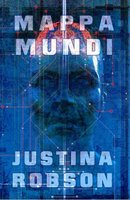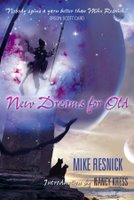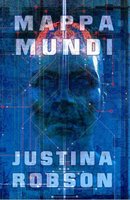On his website Critical Mass, author and former Science Fiction Chronicle reviewer Don D’Ammassa reviews Alexis Glynn Latner’s debut novel, Hurricane Moon, which will be coming out in just a few weeks.
which will be coming out in just a few weeks.
 “I’ve been reading short stories by Latner for about ten years now, almost all of them in Analog, and have found her to be a reliable source of interesting and accessible stories of hard science fiction. At long last we have a chance to read her at novel length, and it was worth the wait, although I hope we don’t have to wait as long for her next. It’s an old fashioned space adventure, but with more contemporary sensibilities and healthy doses of intelligent and not too abstruse science… Extremely well written, tightly plotted, full of that old fashioned sense of wonder about the universe. I hope to see much more from this author in the future.”
“I’ve been reading short stories by Latner for about ten years now, almost all of them in Analog, and have found her to be a reliable source of interesting and accessible stories of hard science fiction. At long last we have a chance to read her at novel length, and it was worth the wait, although I hope we don’t have to wait as long for her next. It’s an old fashioned space adventure, but with more contemporary sensibilities and healthy doses of intelligent and not too abstruse science… Extremely well written, tightly plotted, full of that old fashioned sense of wonder about the universe. I hope to see much more from this author in the future.”
Meanwhile, I’ve found a host of Pyr reviews that I mostly missed in his 2006 archive. Don says that the reviews “were written for Science Fiction Chronicle, but most were never used.” So let’s look at some of them here!
Fast Forward 1, edited by Yours Truly:
edited by Yours Truly:
“Lou Anders has put together a collection of twenty original stories, designed to be the first in an ongoing series along the lines of Terry Carr’s Universe series or Damon Knight’s Orbit collections, although the emphasis appears to be on hard SF. There are stories by some of the best known writers in that sub-genre – Stephen Baxter, Larry Niven, Ken Macleod – as well as representatives of the more literary end of the spectrum – Gene Wolfe, Paul Di Filippo, Pamela Sargent. Non-theme anthologies are almost always more readable than specialized ones and this is no exception, very high quality throughout and enough variation to reward almost any reader’s taste.”
 Sagramanda (A Novel of Near-Future India)
Sagramanda (A Novel of Near-Future India) by Alan Dean Foster:
by Alan Dean Foster:
Near future India is the setting for this surprisingly low key novel, surprising because there are a lot of violent things happening in it. The central plot is the theft by a scientist of a revolutionary new, but undescribed, discovery which he is trying to sell to a competitor… Nicely understated, and a depressing and unfortunately not entirely inaccurate portrayal of the future of much of the urban world, and not just India.”
Starship: Pirate by Mike Resnick:
by Mike Resnick:
“Resnick combines space opera, a touch of military, more than a touch of humor, and his usual talent for creating larger than life characters in this new series. Consistently good fun from beginning to end.”
Mappa Mundi by Justina Robson:
by Justina Robson:
“This one might well have been packaged as a contemporary thriller rather than SF, and it’s a good one regardless of your mind set while you’re reading it.”
Infoquake by David Louis Edelman:
by David Louis Edelman:
“A debut novel and the first in a trilogy, set in a future when multi-national corporations have become virtual governments… Lots of interesting speculation and a plausible and interesting plot. I found the prose a bit awkward from time to time but not so much that it significantly interfered with my enjoyment of the story.”
 Paragaea: A Planetary Romance
Paragaea: A Planetary Romance by Chris Roberson:
by Chris Roberson:
“The cover blurbs compare this to Edgar Rice Burroughs and Leigh Brackett, and with some justification…. a bit difficult to take seriously at times, but if you just let go and enjoy the ride, Roberson conducts a pretty rousing tour of his universe.”
New Dreams for Old by Mike Resnick:
by Mike Resnick:
“I am so used to thinking of Mike Resnick as primarily a novelist that it came as a surprise to read through the table of contents of this new collection and discover how many of them I remembered. And how many of them have appeared on Hugo and Nebula ballots. Although a few have been previously collected, most appear in book form for the first time… Some are funny, some are dead serious. All are nifty. This is a big, representative, and above all very satisfying selection of his short fiction.”
Resolution: Book III of the Nulapeiron Sequence by John Meaney:
by John Meaney:
“The final volume of the Nulapeiron trilogy concludes this sequence set in a future so remote and different that it is sometimes difficult to identify with the characters and situations. Technology and mental powers have advanced to the point where they are indistinguishable from magic….You’ll have to suspend your disbelief pretty radically for this one, but if you can get yourself into the story, you’ll have a wild and exciting ride ahead of you.”
 The Destiny Mask
The Destiny Mask by Martin Sketchley:
by Martin Sketchley:
“Pyr Books has been reprinting quite a few British and Australian novels which had not previously appeared in the US, including this, the second in a series. The setting is an interstellar empire and the plot is one familiar to readers even outside the genre, the rivalry between two twins, separated as babies and ignorant of each other’s existence, who become pivotal players in a battle between rebels and a repressive interplanetary dictatorship. I liked this one considerably better than its predecessor, The Affinity Trap. The characters are more realistic and the plot tighter and more involving.”
The Liberty Gun by Martin Sketchley
by Martin Sketchley
“I had a mixed reaction to the first two novels in the Structure series, but the third is a much more satisfying space adventure that mixes time travel, aliens, military SF, and general intrigue. …the situation is considerably more complicated than any of the characters realize. It takes a while to get into the story, but once you’re there, you won’t want out.”
 Genetopia
Genetopia by Keith Brooke:
by Keith Brooke:
“Pyr has reprinted several British SF novels that have not previously been available in the US, including this one from 1999. Brooke should have been discovered earlier because he has definite talent… Many of the things Flint encounters are fascinating ideas, but after a while it becomes just a parade of wonders and readers may find themselves impatient to get to the destination.”
Note: Genetopia is an original novel, first published by Pyr. Don is apparently confusing it with a previously published short story of the same name. Meanwhile, with this profusion of Pyr reviews, Don has put my own personal archive of our books’ reviews over the 500 mark. And while I’m sure I have missed some somewhere, I’m happy to report that out of some 503 reviews I’ve tracked since we launched – appearing everywhere from tiny websites I’d never previously heard of to huge venues like the Washington Post and Entertainment Weekly – I’ve only logged 27 negative ones! Which is nice.
 Three more Pyr books have appeared for the Kindle.
Three more Pyr books have appeared for the Kindle.









